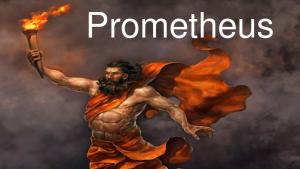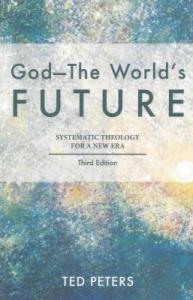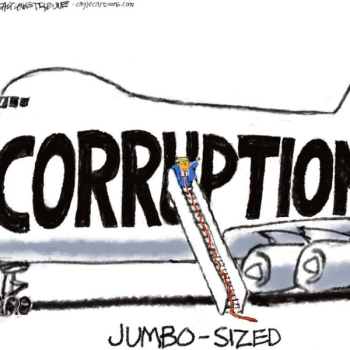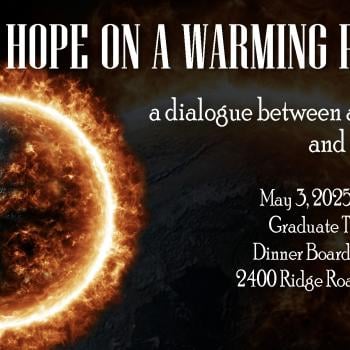 Short Prayers? What about hope? And, what about a theology of hope? What about forethought? What about thinking ahead?
Short Prayers? What about hope? And, what about a theology of hope? What about forethought? What about thinking ahead?
Then I saw a new heaven and a new earth. (Revelation 21:1a)
Hope invites us to think ahead. The Theology of Hope invites us to think ahead about God’s promises. But, does it invite us to think ahead about our human possibilities, opportunities, and responsibilities? Is there any room in Christian hope for the pagan Titan, Prometheus?
Prometheus, Pride, and Promise
Prometheus, I think, too often gets a band rap from Christians. Because he sought to defy Zeus, we think of him as the symbol of humanistic arrogance throwing his fist up defiantly against the power of the divine. Yet, there is another quality to this mythical figure, a quality from which we could learn much. That quality is embedded in his name, which means “fore-thought.” Pro in Greek means before or ahead and mathein is the verb to think. Prometheus thinks ahead.
The story, you may recall, goes like this. The Greek god of the sky, Zeus, was in a bad mood. While in his bad temper he decided to withhold fire from the earth, letting the human race stumble around in the darkness and the cold. Prometheus, the farsighted one, saw the potential value of fire for nascent humanity. So he craftily snuck up and into the realm of the gods–into heaven—where the sun is kept. There he lit his torch on the sun and carried fire back to earth as a gift to human civilization.
 Prometheus could see that it would be the gift of fire that would separate us from the kingdom of the beasts. With fire we could forge the metal tools with which to cultivate the earth. With fire we could warm our houses and render ourselves independent of climate and weather. And with fire we could stay up late in the evening reading and writing and making plans for future achievements.
Prometheus could see that it would be the gift of fire that would separate us from the kingdom of the beasts. With fire we could forge the metal tools with which to cultivate the earth. With fire we could warm our houses and render ourselves independent of climate and weather. And with fire we could stay up late in the evening reading and writing and making plans for future achievements.
But Prometheus, you may remember, had a slow-witted little brother named Epimetheus. This name, of course, coming from the Greek prefix epi meaning after, is translated “after-thought.” Epimetheus did not plan ahead. He simply lived for the joys and pleasures of the present moment. As a result his gift to the world was evil and suffering.
The story continues this way. Zeus, in his anger at Prometheus for stealing the fire, decided to take revenge. He knew of Epimetheus’ weakness. With the help of the other gods, Zeus fashioned a beautiful woman by the name of Pandora. He sent Pandora into the neighborhood of Epimetheus. Prometheus, as one might expect, had already warned his brother not to accept anything sent from the vengeful Zeus. But once Epimetheus fixed his eyes on the glowing beauty of Pandora, he threw all warnings to the wind. He married her immediately and took her into his house.
Epimetheus and Pandora
Now, it was in the house of Epimetheus where the big box was kept. This was the box in which all evil had been securely enclosed so as to protect humanity. As long as the lid was shut tightly, no evil could hurt anyone of us. But the curiosity of Pandora led her to ask, “I wonder what is in that box?” So, she opened the lid. Immediately out flew a multitude of plagues: gout, rheumatism, envy, spite, hatred, revenge, and all sorts of evil that spread far and wise over the entire earth. By the time Pandora could slam the lid back down, only one thing remained trapped in the box. That one thing was hope.
 In this mythical story we have two models of the kind of people we can be. Prometheus is the embodiment of wise forethought; he makes imaginative plans and preparations for our future. Epimetheus, in contrast, chose not to foresee anything. He allowed himself to be guided only by impulse and desire, living for the moment.
In this mythical story we have two models of the kind of people we can be. Prometheus is the embodiment of wise forethought; he makes imaginative plans and preparations for our future. Epimetheus, in contrast, chose not to foresee anything. He allowed himself to be guided only by impulse and desire, living for the moment.
As I look about our world in the 21st century, it appears to me that Epimethianism is rampant. The world to which Prometheus once brought fire is being consumed by that same fire. Globally, forests large enough to cover half the state of California, are being cut each year and not being replaced, lost to lumber interests, developers, and to fire places. Rivers, lakes, and now even our oceans are becoming contaminated from industrial effluent and chemical waste dumping. Smoke rising from auto emissions and fossil fuel power plants comes down again as acid rain, killing trees and fish, and raising our planet’s temperature. From nuclear power plants we daily produce low and high level radioactive waste—the most potent of which will remain dangerous for a quarter million years—so that power companies and their stockholders can make short-term profits while leaving future generations to pay a staggering clean-up bill. There may be no future generations at all, of course, if we slide into a political conflict that will result in the firing of a handful of the 50,000 nuclear weapons we have aimed at one another. Today we have Epimetheus’ world. Perhaps no world tomorrow. I certainly hope that hope is still protected in Pandora’s box.
Our ecological ethicists are pleading for the human race to be more Promethean. They ask us to think ahead.
Would that our human race could be more Promethean and plan ahead. The Bible, I think, at least in part, is a Promethean book. It concludes where we should begin, that is, with a vision of the coming new heaven and new earth. It is a vision of a world at peace and harmony, a world beyond war and stupidity. To be Promethean in our time of unbridled Epimethianism, it seems to me, would mean we take the Bible’s vision of the new world seriously and use it as a guide in the present, as a guide for planning ahead.
PRAYER
God of creation and new creation, give us the combination of vision and wisdom necessary to think ahead. Fulfill our hope. Amen.
▓
 Ted Peters is a Lutheran pastor and emeritus seminary professor. He is author of Short Prayers and The Cosmic Self. His one volume systematic theology is now in its 3rd edition, God—The World’s Future (Fortress 2015). This volume looks at all Christian teachings through the lenses of hope in God’s promises for the future. God has promised a new creation.
Ted Peters is a Lutheran pastor and emeritus seminary professor. He is author of Short Prayers and The Cosmic Self. His one volume systematic theology is now in its 3rd edition, God—The World’s Future (Fortress 2015). This volume looks at all Christian teachings through the lenses of hope in God’s promises for the future. God has promised a new creation.
He has undertaken a thorough examination of the sin-and-grace dialectic in two works, Sin: Radical Evil in Soul and Society (Eerdmans 1994) and Sin Boldly! (Fortress 2015). Watch for his forthcoming, The Voice of Public Christian Theology (ATF 2022). See his website: TedsTimelyTake.com.
▓













